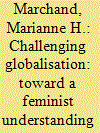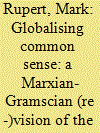|
|
|
Sort Order |
|
|
|
Items / Page
|
|
|
|
|
|
|
| Srl | Item |
| 1 |
ID:
051660


|
|
|
|
|
| Publication |
Dec 2003.
|
| Summary/Abstract |
'Given the success of Naomi Klein with her book No Logo and Noreena Hertz's The Silent Takeover, can we infer from this that feminists are finding themselves in the limelight of the anti-globalisation movement?' With this question a reporter of the Dutch magazine Op Gelijke Voet approached me about two years ago.
|
|
|
|
|
|
|
|
|
|
|
|
|
|
|
|
| 2 |
ID:
051662


|
|
|
|
|
| Publication |
Dec 2003.
|
| Summary/Abstract |
The impoverishment of mainstream International Relations (IR) scholarship, especially as it is practised in the bastions of academic power and respectability in the United States, can be registered in terms of its wilful and continuing conceptual blindness to mutually constitutive relations of governance/resistance at work in the production of global politics. This has been underscored in recent years by the rise of powerful transnational social movements seeking to reform or transform global capitalism, a coalition of coalitions recently reincarnated in the form of a global peace movement opposing the blatantly neo-imperial turn in US foreign policy. As the essays in this Special Issue attest, critical scholars of world politics have developed conceptual vocabularies with which to (re-)construct, from various analytical-political perspectives, aspects of these governance/resistance relations. My task in this article is to argue that - under historical circumstances of capitalist modernity - a dialectical understanding of class-based powers is necessary, if by no means sufficient, for understanding social powers more generally, and issues of global governance and resistance which implicate those powers. Although it is not without its tensions and limitations, I have found re-envisionings of Marxian political theory inspired by Western Marxism - and in particular by interpretations of Antonio Gramsci - to be enabling for such a project. Marxian theory provides critical leverage for understanding the structures and dynamics of capitalism, its integral if complex relationship to the modern form of state, the class-based powers it enables and the resistances these engender; and Gramsci's rich if eternally inchoate legacy suggests a conceptual vocabulary for a transformative politics in which a variety of anti-capitalist movements might coalesce in order to produce any number of future possible worlds whose very possibility is occluded by capitalism. In the present context of globalising capitalism and neo-imperialism, such resistance has taken the form of a transnational confluence of movements for global justice and peace.
|
|
|
|
|
|
|
|
|
|
|
|
|
|
|
|
| 3 |
ID:
051661


|
|
|
|
|
| Publication |
Dec 2003.
|
| Summary/Abstract |
Talk of human rights is, currently, nearly as ubiquitous as talk of globalisation. While globalisation has been described as 'the most over used and under specified term in the international policy sciences since the end of the Cold War', the same could reasonably be said of 'human rights'. Human rights are a product of the immediate aftermath of World War II, and thus they developed, in their contemporary form, in the context of the Cold War. The philosophical and political roots of human rights, of course, date back at least to the seventeenth and eighteenth centuries, and some would say even further, to the Stoics of Ancient Greece. Globalisation, too, has unfolded mainly in the late twentieth-century and has reached a position of prominence in the post-Cold War context; at this juncture, and according to popular perception, the spread of market capitalism, Western culture and modern technology fit comfortably with the death of socialism and the 'end of history'. But globalisation too has roots that date back much earlier - as early as, it has been argued, the fourteenth century.
|
|
|
|
|
|
|
|
|
|
|
|
|
|
|
|
| 4 |
ID:
051663


|
|
|
|
|
| Publication |
Dec 2003.
|
| Summary/Abstract |
We find ourselves amidst an explosion of literature about how our worlds are being fundamentally changed (or not) through processes that have come to be clumped under the vague title of 'globalisation'. As we wander our way through this literature, we might find ourselves - with others - feeling perplexed and anxious about the loss of a clear sense of what politics is, where it happens, what it is about, and what we need to know to understand and engage in it. This in turn leads many of us to contribute to a slightly smaller literature, such as this Special Issue, seeking to theorise how the space and character of politics might be changing, and how we might adapt our research strategies to accommodate these changes and maintain the confidence that we, and the disciplines we contribute to, still have relevant things to say about international politics. While this is not a difficult thing to claim, and it is not difficult to find others to reassure us that it is true, I want to suggest here that it is worth lingering a little longer in our anxiety than might be comfortable. I suggest this because it seems to me that there is, or at least should be, more on the table than we're yet grappling with. In particular, I argue here that any attempt to theorise the political today needs to take into account not only that the character and space of politics are changing, but that the way we study or theorise it - not only the subjects of our study but the very kind of knowledge we produce, and for whom - may need to change as well. As many others have argued, the project of progressive politics these days is not especially clear. It no longer seems safe to assume, for example, that the capture of the state or the establishment of benign forms of global governance should be our primary object. However, just as the project of progressive politics is in question, so is the role of knowledge, and knowledge production, under contemporary circumstances. I think there are possibilities embedded in explicitly engaging these questions together that are far from realisation. There are also serious dangers in trying to separate them, or assume the one while engaging the other, however 'obvious' the answers to one or the other may appear to be. Simultaneous with theorising the political 'out there' in the international must be an engagement with the politics of theorising 'in here,' in academic contexts. My project here is to explore how this challenge might be taken up in the contemporary study of politics, particularly in relation to emerging forms of political practice, such as those developed by activists in a variety of contexts. My argument is for an approach to theorising the political that shifts the disciplinary assumptions about for what purpose and for whom we should we produce knowledge in contemporary times, through an emphasis on the strategic knowledges produced through political practice. Such an approach would potentially provide us with understandings of contemporary political institutions and practices that are both more incisive and more enabling than can be produced through more familiarly disciplined approaches.
|
|
|
|
|
|
|
|
|
|
|
|
|
|
|
|
|
|
|
|
|